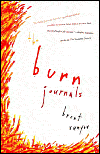The Burn Journals (Brent Runyon)
 So I received a reading list in the mail from a writer's organization I used to be involved with at ASU, one that was too expensive for me to continue to be involved with, sadly. Sigh. They were putting together an online book club of sorts and, though I didn't really feel like paying any money to be a part of such a group, I have no problem using their free list for my own purposes when I can't seem to think of what I want to read next. This book was the October 2006 selection.
So I received a reading list in the mail from a writer's organization I used to be involved with at ASU, one that was too expensive for me to continue to be involved with, sadly. Sigh. They were putting together an online book club of sorts and, though I didn't really feel like paying any money to be a part of such a group, I have no problem using their free list for my own purposes when I can't seem to think of what I want to read next. This book was the October 2006 selection.I guess I should have heeded the red flag in my head when I picked up the reserved book from my library and noticed a bright, green "Teen" label on the spine. Teen? I thought. Really? But I dismissed the thought because, after all, the recommendation had come from a reputable, college organization who wouldn't have me reading childish bullshit. And there are quite a few good novels that cross the border between adult and chidlren's lit. In my opinion, this did not turn out to be one of them.
The Burn Journals is the autobiographical tale of Brett Runyon, who set himself on fire when he was 15 in an attempt to commit suicide. He then survives a lengthy recovery and a change of heart about the purpose of his own life. While Brett is all grown up now, he still writes in the stilted and simplistic style of an adolescent boy, where he dismisses most emotional concerns in order to remember what then-popular program was on television. I think that Runyon is trying to explain why he would do such a thing with this book--I was wondering that too. Aside from some generic remarks about being "sad," I am still wondering. There are emotional currents beneath the surface, currents I wanted to explore but that the narrator supresses (out of vulnerability? embarassment?).
It was like a real, teenage boy was stitting there telling me this story, brushing off my questions, trying to be cool about it all. And I wanted to wring his neck and have him tell me what was really going on, even if he didn't quite know himself, even if the thoughts were incomplete and conclusionless. The book does serve a purpose within the genre so neatly stamped upon its spine: Every teen needs to know that they are not alone in having these nameless, unknowable, apocalyptic feelings and that, yes, they do pass. Things do get better, if not easier, with age because you have more control over yourself and your environment.
Runyon is doing the right thing reaching out to that group, especially the boys, who are under-represented in literature. But I have no idea why ASU would want me to read such a book or why they thought it would be worth discussing and critiquing as a group. I think the conversation would have only one basic thought and direction, something along the lines of:
"That was sad. I wish he hadn't done that to himself. But now, he can help other kids not set themselves on fire, plus he graduated college. Good for him."
To summarize, fire and depression bad. Helping others and sharing feelings good. Any questions?


0 Comments:
Post a Comment
<< Home